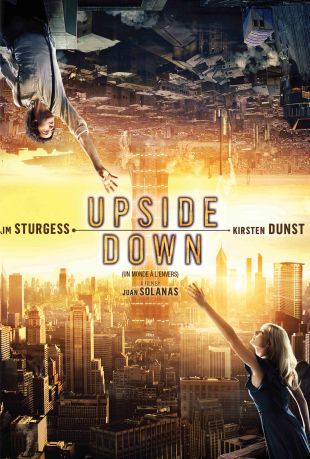
Juan Solanas' ambitious Upside Down wants to be part alternate-universe dystopia, part anticorporate screed, and part love story. What it ends up being, however, is a creative thought exercise about a fictional physical reality.
As explained to us in the opening monologue, the setting of the film is based on the concept of "double gravity" -- a pair of planets share the same sun, but are close enough to each other that if you stand at the very tippity top of one, you can see people at the bottom of the other clearly (kind of like how close Russia is to Sarah Palin's house). Objects and people are subject to the gravity of their own planet, unless you load yourself up with material (known as "antimatter") from the other planet, in which case you can offset the original gravitational pull. However, that effect only lasts until the antimatter becomes so hot that it burns up.
This is the kind of ridiculous setup that's easy to just run with, if only there were a story or characters we cared about. It turns out that the center of the movie is Adam (Jim Sturgess), a guy from "down below" who falls in love with Eden (Kirsten Dunst), a woman from "up top." They meet secretly at the edge of their planets while growing up, looking longingly at each other and occasionally stealing kisses -- apparently Dunst never passes on a script that lets her get in some upside-down smooching.
The lovebirds are separated by Transworld, a corporation that takes oil from the down-below planet, refines it, and sells it back to the impoverished inhabitants, shifting a huge amount of wealth to the upper planet in the process. A decade later, Adam goes to work for the company in the hope of finding Eden, but soon discovers how ruthless the corporation actually is.
If nothing else, Upside Down certainly has a distinctive look. With its M.C. Escher-like manipulation of space, there are a handful of dizzying shots that make it apparent why the filmmakers were so attracted to this motif. Sadly, this concept is the only interesting aspect of the whole production. Adam and Eden don't register as characters beyond their painfully symbolic names, the economy of this corporate-controlled world doesn't make much sense once you start thinking about it, and the sci-fi angle itself so stretches our ability to suspend disbelief that pretty soon the very thing we enjoyed most about the movie becomes just as tiresome as everything else.
Give Solanas big points for originality -- he's shooting for something like Gattaca or Blade Runner here, a fully realized alternate universe. He would have come up with a genre classic if he'd managed to tell a story that had any connection to the real world.
